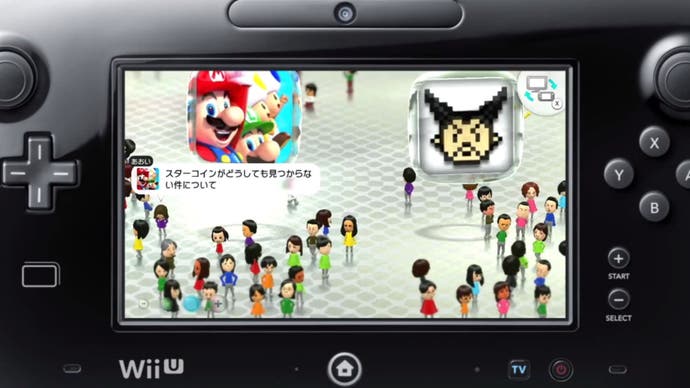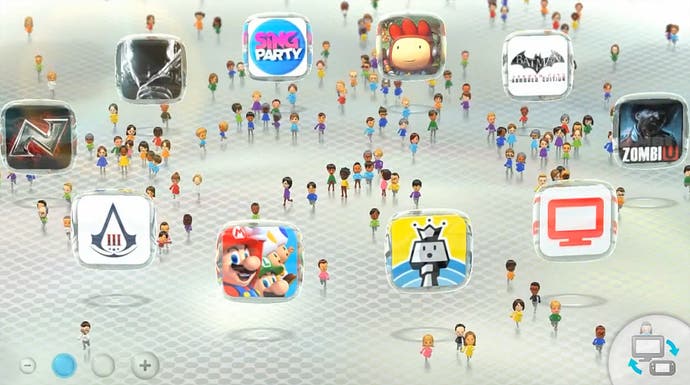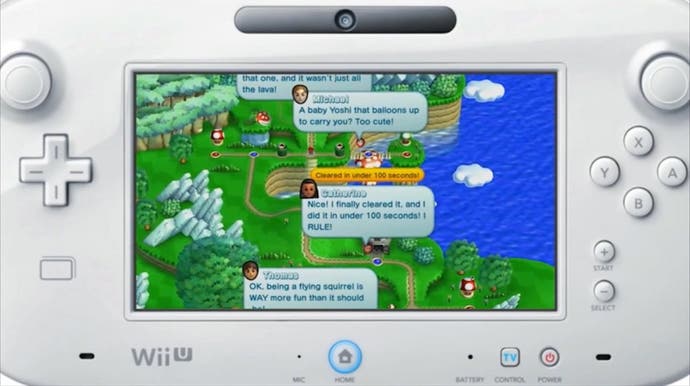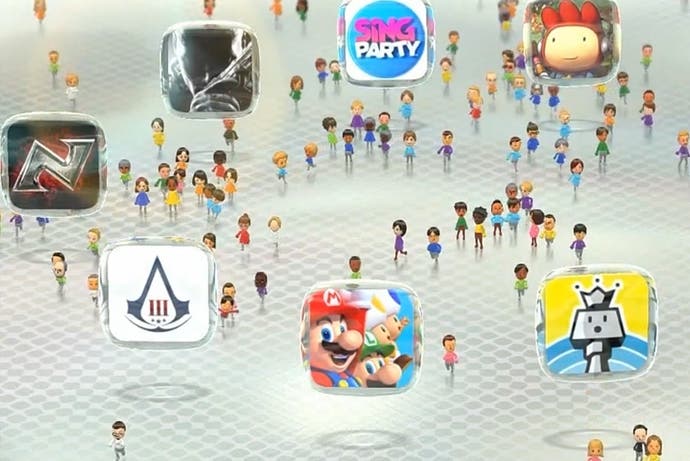Masters of the Miiverse
What does the Wii U bring to the online world? Chris Donlan investigates.
One of the more surprising traits of the current generation of console hardware is that the machines themselves have become definite places. Whether it's Xbox Live or the PlayStation Network, they exist in tangible ways even if there's no game sat in the tray or chattering away on the hard drive. The Xbox 360 is forever shedding its skin in this regard, adding and then cutting social features, moving from those swooshing blades through to Metro - not that it's called Metro anymore - in the space of three Gears of War games. PS3, on the other hand, has stuck with the XMB from the start, opting for cold, sleek, slightly impenetrable style, even if Sony's recently decided to give the shop a bit of a seeing to.
The Wii, meanwhile, opted for an interface that sort of resembled the CCTV room of one of the planet's cleanest shopping malls: neat rows of TV screens flickering with little SD worlds. Now the Wii U's here, however, and the internet's a lot more comprehensively integrated into Nintendo's latest OS. The Wii U's the first console to be born with the age of social media in full flow, in fact, so it probably shouldn't be that surprising that the status update and its ilk have had an impact on the company's thinking. Nintendo's response to all of this, though, does feel rather surprising. With the Miiverse, we're finally seeing Nintendo's answer to PSN and Xbox Live - not to mention Twitter and Facebook - and it's a very Nintendoish kind of answer.
Reading through Jeffrey's piece on the subject the other day, I was initially a little disappointed. The Miiverse is a grand sort of name, and I think when I heard it for the first time I probably pictured shifting, swirling constellations of Nintendo avatars: shimmering Oort clouds of bowl cuts, sunglasses, goatees and those funny little piggy noses you use when building caricatures of unloved work colleagues. In reality, when you fire the thing up, either from the main Wii U dash or in-game, with a tap of the GamePad's home button and a quick selection from the touchscreen, you're landed with something that looks rather drab and clinical: a selection of message boards themed around different communities, all of which currently relate to specific Wii U games.

After a few minutes of using Miiverse, however, I started to see promising traces of Gunpei Yokoi Thinking at work. Yokoi was one of Nintendo's greatest designers, probably most famous for creating the Game Boy - and most infamous for helping birth the Virtual Boy. One of his persistent themes was that older, cheaper tech could be repurposed and used in interesting ways that made up for its limitations, which is why the most iconic handheld of all time had a cost and energy-efficient urine-coloured screen that had to be angled in direct sunshine, while competitors with their gleaming backlit displays ended up on the scrapheap. (If your urine genuinely does match the hue of a Game Boy screen, incidentally, see your doctor and try to drink more water.) Faced with social media, Yokoi might just have come up with something like a straightforward message board set-up, I suspect: it's hardly flashy, but it's quick to load and filled with interesting possibilities for connecting people and their interests.
In reality, Miiverse is a bit more complex than a simple message board: you can select users to follow, sticking their updates in your own activity feed, you can send private messages to your friends, and you can add screenshots from the game you're playing by switching over to the Miiverse in-title and then posting the frozen image from your telly or GamePad. Oh, and you can even draw little pictures, using a stripped-back art package that will be immediately familiar to any veterans of the DS's PictoChat. For the most part, though, it works like a simple message board: an endless scrolling wall of chat about the games you're playing, and the games you haven't gotten around to yet, a metaverse torrent of cheerful inconsequence, sometimes coalescing into actual conversations, often just fluttering around by itself.
And that turns out to be kind of wonderful, actually, couching each Wii U title in a kind of social fuzziness that means you genuinely feel like part of a community even while playing solo. Sure, message boards devoted to video games are hardly a blisteringly new idea in the grand scheme of things, but having the message board for the game you're currently playing available on what's essentially a pause menu really changes the proposition.
I spent the morning with New Super Mario Bros. U on the office machine, and its Miiverse community genuinely enhanced what's already a fairly special game. Every few minutes I could duck out of the World Map to see what other players were thinking about things, whether they were friends or strangers, stuck and seeking help or delighted by a new discovery (spoilers are easy to tag and hide, mind), or even just turning up to show off a wonky drawing of Yoshi they'd sketched.
It's a distraction, of course, but it's strangely frothy and enthusiastic and intoxicating, too: a result, perhaps, of that new console smell the Wii U's currently exuding and the fact that the whole thing is fairly aggressively moderated - as you'd expect from an entertainment device built with young children in mind.
"After a few minutes of using Miiverse, I started to see promising traces of Gunpei Yokoi Thinking at work."

Switch over to more grown-up communities like ZombiU, and it doesn't really get much seedier. Instead, it's just picto sketches of the shambling undead, tips on nasty traps you might want to avoid, and hand-drawn maps leading to secrets. I browsed everything from the Black Ops 2 community - mainly people asking whether the game was worth a punt - to the Arkham City community - mainly pictures of Batman - and the most negative thing I spotted all morning was someone admitting that they found Ubisoft's zombie-em-'up a touch disappointing. In the comments that followed, however, rather than receiving a good honest griefing, the guy in question was basically flamed with compassion - urged to keep playing, and promised that the game would get better. A chiptune version of Climb Every Mountain wouldn't have been out of place.
One of my objectives following a morning with Miiverse was to see how its idea of community compared to those of Xbox Live and PlayStation Network. In reality, though, it turns out that there are no easy comparisons. Microsoft and Sony are great at putting you together with your friends, but strangers are by and large left for encounters in death match and online co-op. The Miiverse, however, is all about sticking you in with people you've never met, and then ensuring, perhaps rather heavy-handedly at times, that everyone behaves.
Moderation plays a large part in this, of course, both via roving admins and the ease with which you can flag rude or spoilery posts, but so does the little tick icon that informs you whether the person talking about a game has actually played it. With such simple mechanisms, Miiverse settles each Wii U title into a kind of warm bubble bath of chatter and jokiness, immersing you in cheeky comments, cute - and often bizarre - sketches, and requests for help in finding that last sodding coin on Tilted Tunnel. Though obviously without the sodding part.
Throughout all of this, reassuringly mindless as it often is, Miiverse places the focus firmly on the games: they're the reason we're here, they're what we're actually engaged with, and they're why I spent half an hour drawing a picture of Mario stepping on a Goomba only to have to delete the whole thing when I realised I'd accidentally given the plumber three arms.
"Nintendo is using social media to close the gap between games and the playground discussions that have always surrounded the best of them, from Pokémon to Dark Souls. We're all in there together. Why not say hello?"

Miiverse - with its ability to tag posts with the level or section of an adventure you're currently moving through - turns out to be great for getting a player's sense of the Wii U's games: for getting a glimpse at the texture and challenge of titles you haven't tried, or for sounding out the titles you have for every last secret, every last surprise. Mario and Zelda instalments, in particular, are all about private rituals and childhood memories: now they'll come with virtual scrapbooks that you can build up as you play, and they'll put you in touch with other people who feel the same way you do. Nintendo is using social media to close the gap between games and the playground discussions that have always surrounded the best of them, from Pokémon to Dark Souls. We're all in there together. Why not say hello?
What with all the pre-release chat about moderation, I was half expecting Miiverse to be clinical and a bit eerie, like one of those Star Trek episodes where the crew beams down to a paradise planet to discover that the flowerbeds are only kept so pretty because of the massed ranks of jackbooted thought police, and Kirk's left to then ponder the terrible cost of freedom while kissing a pretty lady who has latex horns glued to her head because she's from space. In reality, Miiverse doesn't yet feel terribly creepy at all: the seemingly endless positivity is a little weird at times, but it seems genuine, too.
My favourite thing so far? I think it's that, like Fraps on the PC, the Miiverse also turns each game into a bit of a safari, as you keep an eye out for spectacle or happy accident while your finger hovers over that Home button, ready to pause the game and save a snapshot. Just before lunch, I spent an age trying to get exactly the right picture of Mario sliding down a ramp collecting coins. This is worrying, probably, as I'm getting on a bit and have yet to offer too much of lasting substance to humanity in general. It was fun in a way that Mario games haven't been fun before, however, and it honestly did make me feel like I was playing alongside the worldwide Mario horde. Anyway, I finally got the pose I wanted, I posted it and then I went back into the game and forgot all about it, having added to the congenially inane chatter ringing around the Miiverse. Another babbling voice in amongst thousands. Not bad, Nintendo.

